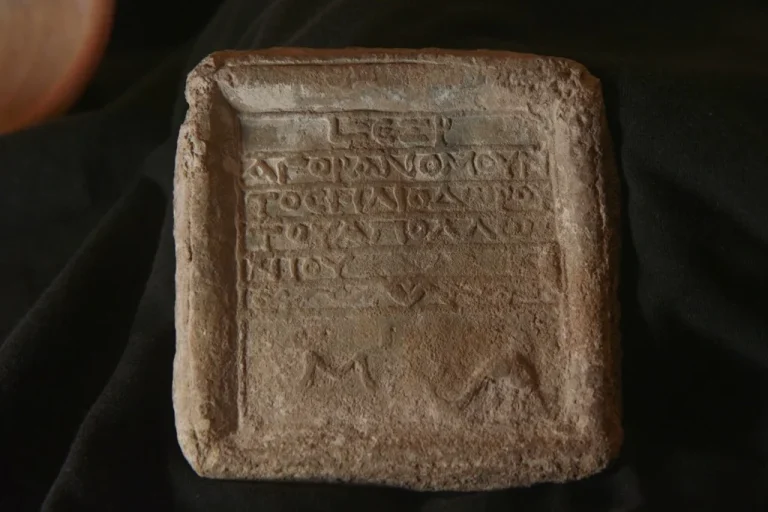Jerusalem, 19 August, 2025 (TPS-IL) — A rare 2,150-year-old lead weight bearing the name of a Hellenistic-era trade official has been recovered in jerusalem, the Israel Antiquities Authority (IAA) announced on Tuesday. The artifact, preserved in excellent condition, was seized from an antiquities shop following an undercover operation by the IAA’s Theft Prevention Unit.
The weight, dated to 148/7 BCE, carries a Greek inscription reading: “Heliodorus son of Apollonios, Agoranomos.” The title identifies him as an agoranomos — the municipal official responsible for regulating weights and measures and preventing fraud in commerce.
“The weight is absolutely precise: one mina, the standard unit of the time, equal to one hundred Greek drachmas,” the IAA said in a statement. A marking resembling the Greek letter “M” also appears on the piece, likely denoting the mina unit. Next to the inscription, a dolphin symbol was carved, though its significance and possible connection to the city of origin are still under study.
IAA inspectors said the object was almost certainly looted.
“The removal of an archaeological artifact from its site without a proper excavation results in the loss of invaluable historical information,” explained Ilan Haddad, head of Antiquities Trade Supervision at the IAA. “Had we found the artifact in its precise archaeological context, it could have enriched our historical knowledge significantly. At present, unfortunately, we can only speculate from which ancient city the item was looted and what its context was.”
The discovery sheds light on the Hellenistic administration that governed the Land of Israel following the conquests of Alexander the Great. According to IAA researcher Ido Zangen, the names Heliodorus and Apollonios suggest the spread of Greek culture among the region’s population.
“The Greek names of Heliodorus and his father, Apollonios, attest to a Hellenized population,” Zangen said. “Both names are connected to the Greek sun gods—Helios and Apollo—and indicate a cultural-religious affinity with the Hellenistic culture that ruled the region at that time. These names were especially common in Idumea, where the local god Qos was identified with the Greek sun gods.”
The IAA is investigating whether the weight originated in Maresha, the capital of Idumea in the Hellenistic period. In Maresha, additional artifacts related to the office of the *agoranomos* have been discovered, with names and dates closely matching those on the Jerusalem weight.
Weights and vessels from the same period mention officials named Apollonios, Heliodorus, and Antipatros, leading researchers to suggest that such posts often remained within prominent families. “It is well known that in the ancient world, government offices—including that of the agoranomos — often passed within families, from father to son,” Zangen explained. “Nevertheless, these names were not particularly rare, so there is no absolute certainty that the present weight originates from Maresha.”
The IAA emphasized that antiquities dealers are forbidden by law from purchasing items of unknown origin, calling it a criminal offense. The agency is working to identify those involved in looting and trafficking the weight.
Heritage Minister Rabbi Amihai Eliyahu praised the recovery, saying: “The struggle against antiquities looters and the trade in antiquities helps to preserve the cultural treasures of the State of Israel. Every historical artifact enables us to piece together additional parts of the historical puzzle of the people of Israel and the Land of Israel.”






























